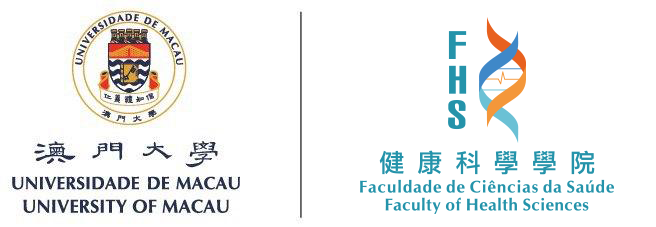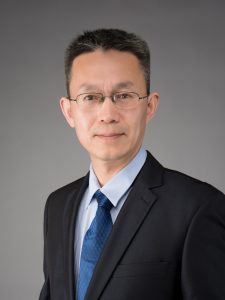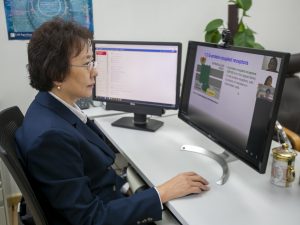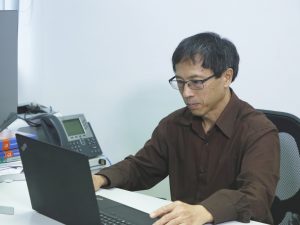Editor’s Note: Since the novel coronavirus outbreak and the consequent suspension of classes to prevent the spread of the virus, distance education has become a hot topic in Macao, Hong Kong, and mainland China. Here at the University of Macau (UM), faculty members have been offering online courses to ensure that students keep learning amid class suspension. In these My UM articles, we cover the online courses from different faculties and departments and take a closer look at how faculty members prepare these courses and how they monitor the students’ learning progress.
In this article, we interview several faculty members in the Faculty of Health Sciences (FHS). They are Prof Xiang Yutao, an expert in psychiatric clinical medicine ; Prof Luo Qian, an expert in cancer research; Prof Garry Wong, an expert in genetics, and Prof Chao Chong Hang, an expert in biology. They share with us their experiences with distance teaching.
Adjusting Course Content to Reflect the Epidemic
Prof Xiang Yutao has been long involved in the studies of the clinical epidemiology of psychiatry, psychiatric clinical medicine, and related topics. This semester, he teaches an online course in public health via UMMoodle and Zoom.
Since the start of this semester, Prof Xiang has been up to his ears in work. He spends a lot of time preparing for each online class. ‘Public health is closely related to the novel coronavirus epidemic, so I adjusted the course content accordingly by incorporating a lot of related topics for students to discuss,’ he says. ‘Distance education cannot deliver the same results as the traditional classroom-based mode, but given the current circumstances, this is already the best option we have.’
Focusing on Case Studies
Prof Xiang always places an emphasis on case studies in his teaching. This semester, while the mode of teaching has changed, the course content remains largely the same. The novel coronavirus epidemic prompted him to use historical examples of infectious diseases such as the Black Plaque and cholera plaques to compare the merits and shortcomings of the different ways in which China and other countries handled different epidemics. He says, ‘I explain to my students from the perspective of public health that although modern medicine is very advanced, when faced with a sudden outbreak of an infectious disease, people tend to handle it in a way that is very similar to how people from several hundred years ago handled it. The bottom line is that the rapid spread of the disease can only be controlled with a public health approach.’
Prof Xiang points out that from the standpoint of public health, controlling the spread of an infectious disease includes several steps. The first step is identity, which means identifying infected patients, suspected patients, and their close contacts as soon as possible. The second step is isolation, which means putting people in the above categories in quarantine. ‘The epidemic in mainland China is now largely under control, but it is important to look back to identify the lessons learned in the process,’ he says. ‘On the other hand, countries like Japan, South Korea, Italy, and the United States are witnessing a rapid increase in the number of infected cases despite their advanced medical services, and we should ask why.’
Monitoring Students’ Mental Health
Back in 2003, during the SARs epidemic, Prof Xiang worked at a Beijing hospital as a psychiatrist. In addition to his own patients, he sometimes also provided psychological counselling to people outside the hospital. In the early days of the novel coronavirus epidemic, several of Prof Xiang’s students became worried or even depressed. To help these students, Prof Xiang shared his counselling experience during the SARs epidemic. The mood of these students is more stable now, and Prof Xiang believes that with the epidemic getting under control and the increasing transparency of information, these worries and fears will gradually dissipate. He has formed an expert psychological counselling team with eight other colleagues from UM to provide psychological counselling to quarantined people and frontline workers.
Teaching Translational Medicine to Undergraduates
Prof Luo Qian mainly studies the metastasis and drug resistance of breast cancer cells. This semester, in addition to supervising postgraduate students, she also teaches a course in translational medicine to 22 undergraduate students. The course focuses on how to carry scientific knowledge ‘from bench to bedside’—in other words, how to translate findings of scientific research into new therapies and drugs.
Prof Luo is no stranger to the software Zoom. She has used it before for video conferences. So when she received instructions to conduct distance teaching after the Chinese New Year holiday, she was able to quickly adapt to this new mode of teaching. Overall, the course has been progressing smoothly according to the original teaching plan. In the past few weeks, Prof Luo focused on such concepts as hormone replacement therapy, cell signalling and target therapy, and immunotherapy. She explained these concepts with PPT slides and videos. For instance, she made a video to show the apoptosis of fluorescent sensors to keep students more engaged.
Studying Hard at Home
Prof Luo usually uploads PPT slides to UMMoodle one to two weeks in advance so that students can have enough time to prepare. After each class, she uploads the online session recorded via Zoom to UMMoodle so that participating students can watch again and absent students can catch up. ‘Of course, distance education cannot entirely replace classroom-based education, but what really matters is that students effectively acquire new knowledge from online learning,’ she says.
Prof Luo feels very pleased to learn that students study just as hard at home as when they were attending physical classes. ‘They ask deeper questions now, which shows that they have really learned some new knowledge,’ she says.
Prof Luo also points out that the elimination of the need to rush from one classroom to another creates more time for after-class discussion. She explains, ‘With online education, I can continue to answer students’ questions when the class time is over, and although it takes additional time, it’s definitely worth it.’
Teaching a Course in Writing Research Proposals
Prof Garry Wong specialises in the fundamental biochemical and genetic mechanisms of dopaminergic neurons. This semester, he teaches an online course in writing research proposals to 58 postgraduate students. In the past few weeks, he always began each class with a simple question which he gave the students ten minutes to answer. This way, he was able to tell how many students were attending the class.
Apart from explaining the content in the PPT slides, he also sets two or three writing exercises for each class. Students are required to complete each exercise within 20 minutes and upload their answers to UMMoodle. Prof Wong will then choose some examples from the submissions to illustrate certain key points. ‘Distance education is great for teaching courses in writing because setting and collecting assignments can both be done on UMMoodle,’ he says. ‘When the time is up, all I need to do is check UMMoodle to see how many students have completed the exercises. It saves a lot of time compared to having a teaching assistant collect the answers.’
Fully-packed Three-hour Lectures
Prof Wong carefully designs each three-hour online lecture to ensure that he stays on track with his original teaching plan. According to him, most students are too shy to turn on the webcam and feel more comfortable discussing and asking questions in the Chat Room. ‘During the three hours, I have to do a lot of things,’ he says. ‘I go through the content while changing the slides and keeping an eye on what the students are talking about in the Chat Room. I feel time goes by quickly in each class.’
Prof Wong says that the first time he taught an online class at home, some students mentioned in passing that his room looked a little messy, so he changed the background into a snow-covered house in Finland. ‘Finland is a very beautiful place,’ he says. ‘I lived and taught there for 20 years. Even now I still go back once or twice a year.’
Pre-recording Oral Presentations
Prof Chao Chong Hang co-supervises the same group of postgraduate students with Prof Wong. He requires students to pre-record their oral presentations and upload them to UMMoodle for him and Prof Wong to grade. ‘This avoids any hiccups that may occur due to unstable internet connection,’ he says.
According to Prof Chao, students have responded positively to distance education, as is reflected in their high attendance rates and prompt submission of assignments. ‘Some students also like to ask and discuss questions in the Chat Room,’ he says. ‘Overall, the atmosphere in class is very good.’

Prof Chao Chong Hang (upper row, 1st from left) interacts with student using Zoom
Source: MY UM
Text: Ella Cheong & Davis Ip │ Photo: Ella Cheong, Davis Ip & Hasen Cai, with some provided by interviewees




